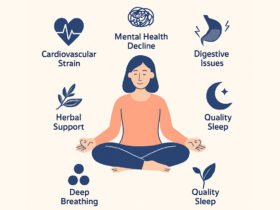Introduction
Sleep is often the first thing we sacrifice when life gets busy. But getting enough quality rest is just as important as proper nutrition and exercise. Poor sleep can silently undermine your health—physically, mentally, and emotionally.
Understanding how sleep impacts your body and learning how to improve your sleep hygiene can lead to better focus, mood, immunity, and even a longer life.
Why Sleep Matters for Your Health
Sleep is not just “rest time” for your brain. It’s an active, vital process where your body heals, your mind processes emotions, and your systems recharge. Chronic sleep deprivation has been linked to numerous health issues.
1. Weakened Immune Function
Your immune system relies on sleep to function effectively. Lack of rest lowers your body’s defenses, making you more prone to colds, infections, and inflammation.
2. Increased Risk of Chronic Diseases
Poor sleep is associated with a higher risk of heart disease, diabetes, obesity, and high blood pressure due to hormone imbalances and systemic stress.
3. Mental Health Challenges
Insufficient sleep can worsen anxiety, depression, and irritability. It affects mood regulation, stress response, and cognitive performance.
4. Hormonal Disruptions
Sleep directly impacts hormones related to appetite (ghrelin and leptin), growth, metabolism, and stress—leading to weight gain and fatigue.
5. Impaired Brain Function
Sleep supports memory consolidation, decision-making, learning, and concentration. Poor sleep can impair focus and increase the risk of accidents.
Signs of Poor Sleep Hygiene
-
Difficulty falling or staying asleep
-
Feeling tired despite a full night’s rest
-
Frequent nighttime awakenings
-
Relying on caffeine or naps to get through the day
-
Irritability or brain fog in the morning
Tips for Better Sleep Hygiene
Good sleep hygiene refers to healthy habits that promote quality sleep on a regular basis. These small changes can lead to big improvements in how you feel and function.
1. Maintain a Consistent Sleep Schedule
Go to bed and wake up at the same time every day—even on weekends. This trains your body’s internal clock.
2. Limit Blue Light Exposure Before Bed
Reduce screen time at least an hour before sleeping. Blue light from phones, TVs, and computers disrupts melatonin production.
3. Create a Relaxing Night Routine
Wind down with calming activities like reading, light stretching, deep breathing, or warm herbal tea.
4. Optimize Your Sleep Environment
Keep your room cool, dark, and quiet. Invest in a supportive mattress and blackout curtains if needed.
5. Avoid Heavy Meals, Caffeine, and Alcohol Late in the Day
These can disrupt your digestion, heart rate, and natural sleep rhythms.
6. Get Sunlight Exposure During the Day
Natural light during the morning or early afternoon helps regulate your circadian rhythm.
7. Move Your Body
Regular physical activity improves sleep quality—just avoid intense workouts too close to bedtime.
Conclusion
Sleep isn’t a luxury—it’s a necessity. By improving your sleep hygiene, you support your body’s healing, enhance your mental clarity, and set yourself up for long-term health and vitality. Better sleep starts with simple, consistent habits—and your health will thank you for it.













Leave a Reply